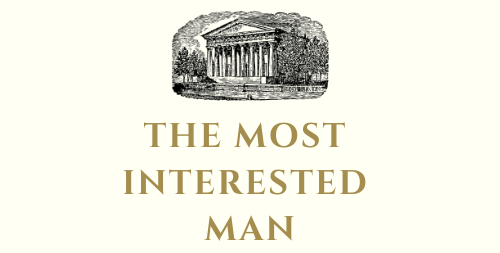As men, we are designed to work. Remove purposeful and engaging work from a man and a host of other problems arise. Restlessness, depression, poverty, and frustration are often symptoms of the lack of good work. For this reason, today we’re talking about the importance of purposeful and engaging work and how to find it.
Is Work Good?
Work is defined as “Activity involving mental or physical effort done in order to achieve a purpose or result.”. For this conversation we’ll define “work” as the job that provides our primary income, although under this definition we could classify the chores and tasks required for everyday life as work as well.
Unless you’re in a unique situation of financial independence or retirement, you likely have some form of work to provide your income. Whether you own your own business, work multiple part time jobs, or have a traditional career, work is major part of your life.
Work is good, but like any good thing it can become bad if approached the wrong way. An example of this is a concept I hear about often, especially from millennial age men, of “hustle”. I don’t favor the word for two reason:

“Hustle” goes against healthy habits
You rarely hear about balance when talking about “hustle”. Rest, family, friends, etc. all take a back burner to “making things happen” in the pursuit of success and money.
“Hustle” is a short-term sprint in pursuit of financial freedom
The idea of hustling is almost always tied to some sort of get rich quick, Multi-level marketing, or other “hack” designed to put you on a beach sipping a Corona for the rest of your life. It isn’t about healthy working habits.
The first issue is something we’re passionate about as a successful life is a balanced life. You can’t sacrifice the other 7 Pillars to grow your Work pillar. Well, you can, but most that do live to regret it. We talk more about this in other resources here on the site.
For now, let’s focus in on the second issue. Is it OK to have a goal of financial independence and early retirement? How early is too early to retire? What sacrifices are permissible in the pursuit of this goal?
I, like many, have found myself day dreaming of a life without the daily drudgery of work. Sometimes it’s a dream of traveling the country for a year or two in an RV to visit all the national parks. Other times it’s living in the country and spending my days tinkering on old guns in a shop. If many of us didn’t have similar dreams they wouldn’t sell many lotto tickets!
Despite these day dreams, deep down I know that work is good and that we should embrace it rather than scheme of ways to avoid it. If taken to far, this goal of avoiding work will lead to risky investments, unhealthy overwork (“hustle”), or laziness.
Work is part of what gives us pride and self-worth. When a man is disconnected from purposeful and engaging work the result is frustration and depression. The rise in mental health issues, alcoholism, and domestic abuse that corresponded with the sharp rise in unemployment due to COVID-19 shutdowns is a clear case study on the risks of high unemployment in a population.
Going back to an early Biblical text from the Garden of Eden we see that Adam was placed in the garden to work. Genesis 2:15 says:
“The Lord God took the man and put him in the Garden of Eden to work it and take care of it.”
Early in Genesis 1:28 God also says:
“Be fruitful and increase in number; fill the earth and subdue it. Rule over the fish in the sea and the birds in the sky and over every living creature that moves on the ground.”
Regardless of your religious leanings these verses are important as they were evidence that work was part of our original design and not a consequence of sin or evil in the world.
We were created to work and work is good.
So Why Do You Want to Quit Your Job?

There’s a Gallup study that showed 70% of American’s aren’t engaged at work. Put more bluntly, they don’t like their jobs. Given that statistic you’re likely to be among those who wish you could quit your job.
If work is good, why is this?
While we were created to work, a consequence of our broken and fallen world is that work isn’t easy. Every job is not just planting a seed, watering it each day, and yielding a bountiful harvest year after year.
Instead, most jobs are more like planting a seed, a bird eats it, planting another, there’s a drought, picking weeds and fighting bugs, only to yield a meager harvest after a year of frustrating effort.
This nature of work requiring effort and sacrifice is what makes it work. I’m not here to tell you there’s a way around that as a solution to hating your job. I don’t care what you do, if it earns money it is going to require sacrifice and effort, risk and disappointment.
Encouraging, eh?
Don’t worry, there’s a solution.
The answer to hating your job is having purpose and engagement in your work. A “why” to push through the drudgery and disappointment and earn the reward on the other side.
The Importance of Purpose in Work

Think about a time where you had to push yourself hard in an exercise. Maybe it was high school football practice or last week’s run, but think of an example that really sucked. Your muscles burned, you were sweating like mad, and you honestly thought you might have a heart attack.
Why did you go through that?
We don’t exercise in a way that pushes us to new levels unless we have a motivating purpose to do so. You might be able to go a short while on sheer willpower, but if you don’t have a reason eventually you’ll give up…because it just isn’t worth the pain.
Maybe your reason is training for a marathon. That’s ok, but why run a marathon? A better reason might be to ensure you’re still fit, flexible and healthy in 40 years when you have grandkids running around. That’s a deep purpose! Only issue here is that 40 years is a long time vs. the pain you’re feeling right now…
In order to push ourselves through discomfort and disappointment we need to have a deep purpose that we can keep in front of us every minute of every day.
In work, we often see that men settle in to jobs they find little or no purpose in simply because they are earning money to support their family. This is admirable, but it is one step removed from a direct purpose of our work itself.
While I will never fault a man who does what he has to (legally and ethically) to provide for his family, working a job you dislike isn’t the ideal situation.
In a perfect world we’d have a job directly connected to our purpose that also provides the income we need to serve the other Pillars in our life.
Is this wishful thinking or a real possibility?
The Importance of Engagement in Work

Equally important to purpose is engagement. This is the invigorating sense of accomplishment we feel when we solve problems, create, collaborate, etc. If you have a high paying job that is connected to your purpose but you don’t find it engaging and challenging, eventually even this will lose its luster.
Each of us is wired differently with unique strengths and drivers. Some thrive on creating new things. Others love working with others to solve problems or the thrill and challenge of a pursuit. If we aren’t engaging these in our work, we quickly become burnt out and disillusioned.
To understand what drives you, think about what you did before you had to work or what you do now outside of work. I firmly believe many of us would do better if we just listened to our 12-year-old selves.
For example, if you loved competition and teamwork at 12 you likely would still enjoy selling large complex projects that require working with a team in high pressure situations. If you were a thoughtful reader and thinker, an academic job may be the right fit.
Neither is better than other, despite how they might be compensated, as long as it matches your natural engagement.
Finding Purpose and Engagement in Work

If the goal is to have a job that we find inherently purpose filled and also challenging and engaging, how do we go about finding this holy grail of employment?
First, I don’t often recommend you immediately quit your job, go to school for basket weaving and hope to earn a living afterward. Taken to the extreme this may be the case, but it doesn’t have to be such a shift. Rather, you can often make a slight shift in a job and find it’s much better suited for you.
Here’s an example from my own life.
My career has been built around managing energy cost for real estate portfolios. I’ve spent 2,000+ hours a year doing this for my job for nearly 12 years and developed a high value skill set in doing so.
Unfortunately, while I was well compensated for this work, I found little purpose in helping a big corporation save another $1-2M/yr on their energy cost and my engagement from my daily tasks became wrote and less challenging.
In 2019 I started to think more about what I enjoyed most about my current job. I loved working with a team to develop solutions and gain approval from key stakeholders Creating and pursuing is engaging to me. I also enjoy speaking and teaching.
From a purpose standpoint, I realized I’d feel more directly connected to my work if I was with a smaller firm where there was a clear connection between each person’s role and the success of the overall firm.
With this in mind I decided to change jobs from my Director of Energy & Sustainability role with a Fortune 500 firm, which involved a lot of operational detail and management oversight, to a Business Development role with a midsize private company server public sector customers.
In this role, I’m still able to leverage the skills learned over 12 years, but much more of my time is spent creating, pursuing, and communicating. I’m also working in a firm that has shared values to my own and when I’m successful I can directly see how it benefits my colleagues, their families, and the customers we serve.
“If You Love What You Do, You’ll Never Work a Day in Your Life”

Going back to our earlier question on the ethics of early retirement, I’d say the desire to escape work and “check-out” as a productive member of society is not good. However, when we put this in the context of our 8 Pillars, we might decide that an early retirement, lower pressure job, or sabbatical with the intent to devote more time to Family, Friends, Service, etc. is a worthwhile trade off to gain more balance.
Ideally, though, we will find work that is both purposeful and engaging while also giving us the time, freedom, and finances to balance all the other 7 Pillars. We would end each day and start each week with a clear sense of direction, excitement, and accomplishment.
If more of us had this, I doubt as many would day dream about doing nothing on a beach.
Why stop working if you love what you do and end each day tired but smiling?
Conclusion
We all need to earn enough money to support the Pillars of our lives. However, the sole pursuit of money can come at the expense of purpose and engagement. We spend so much of our lives at our day jobs that eventually a job that lacks purpose and engagement will wear us down to a breaking point.
Unfortunately, this is the case with generations of men. Work has left us broken and frustrated. I challenge you to think about how to make a change. Maybe it isn’t immediate, but what can do you do today to start in the direction of purposeful and engaging work? Perhaps it’s a side pursuit that doesn’t make much money now, but is what you love. Maybe it’s a slight shift like I made without a major departure from your skills.
Change is scary, but ultimately it will be worth it!
